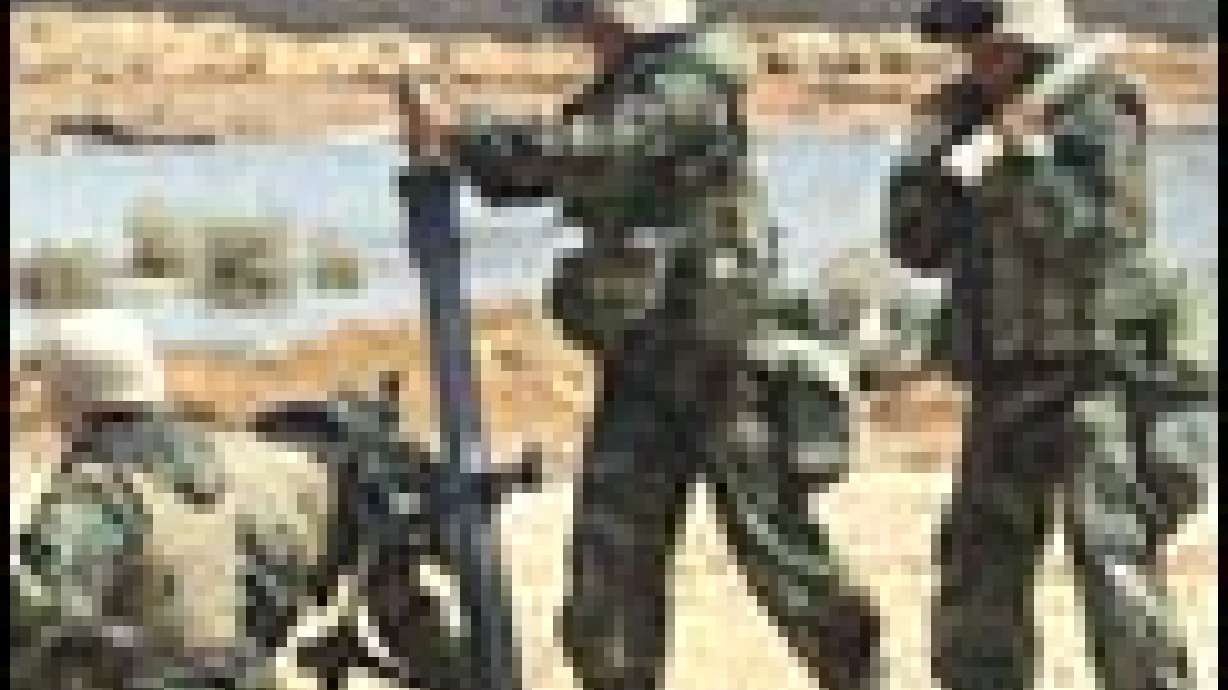Estimated read time: 4-5 minutes
This archived news story is available only for your personal, non-commercial use. Information in the story may be outdated or superseded by additional information. Reading or replaying the story in its archived form does not constitute a republication of the story.
WASHINGTON (AP) -- Army soldiers searching a compound in central Iraq found metal drums that may contain chemical weapons, although testing of samples has not been completed, U.S. military officials said Monday.
Laboratory tests in the United States are needed to confirm whether the drums found south of Baghdad contained chemical weapons, pesticides or something else, Pentagon officials said.
A unit of the Army's 101st Airborne Division searched the compound near Hindiyah, about 60 miles south of Baghdad. CNN shot video of the search that showed soldiers in gas masks using handheld chemical weapons detectors to investigate metal drums.
"This could be either some type of pesticide, because this was an agricultural compound," Gen. Benjamin Freakly told CNN. "On the other hand, it could be a chemical agent, not weaponized."
If confirmed as containing chemical agents that could be used in weapons, the drums found near Hindiyah would be the first components of weapons of mass destruction discovered in Iraq during the war. Finding and eliminating Saddam Hussein's chemical and biological weapons is a goal of the U.S.-led invasion of Iraq, and finding some could mute international criticism of the war.
As U.S. troops occupied one of Saddam Hussein's presidential palaces in Baghdad Monday, Defense Secretary Donald H. Rumsfeld said "the circle is closing" around the Iraqi leader.
"We do know that he no longer runs much of Iraq," Rumsfeld said.
Rumsfeld suggested, however, that complete victory would come "later rather than sooner, simply because it's a big country."
Air Force Gen. Richard Myers, chairman of the Joint Chiefs of Staff, said there were now 125,000 coalition troops inside Iraq and that all but "a couple of dozen" of the Iraqi Republican Guard's tanks had been destroyed.
The number of American troops confirmed killed in the Iraq war rose to 89, the Pentagon announced Monday. The military said 73 of the deaths were from hostile action and 16 were non-hostile deaths. Seven are missing and seven are prisoners of war.
Rumsfeld and Myers both expressed optimism that a top Iraqi official, Ali Hassan al-Majid, had been killed in a U.S. airstrike on his home in southern Iraq. Al-Majid, Saddam's cousin who commanded the southern region of Iraq during the war, was known to his opponents as "Chemical Ali" for his role in chemical attacks on Kurds in northern Iraq.
Myers showed a video of the missile attack to reporters at a Pentagon news conference.
"We believe that the reign of terror of Chemical Ali has come to an end. To Iraqis who have suffered at his hand, particularly in the last few weeks in that southern part of the country, he will never again terrorize you or your families," Rumsfeld said.
Rumsfeld acknowledged reports about the possible chemical weapons site but said first reports often are incorrect.
"We have to take our time and look at it," Rumsfeld said, adding that getting samples to the United States and testing them can take days.
A Knight Ridder News Service journalist traveling with the unit said initial tests of samples from the facility were inconsistent. Some tests did not indicate chemical weapons, while others indicated the presence of G-class nerve agents -- which include sarin and tabun -- and mustard agent, a blistering chemical first used in World War I.
Sophisticated tests are needed to confirm the presence of chemical weapons because nerve agents are chemically very similar to many pesticides.
Earlier reports about possible chemical weapons finds have turned out to be false alarms. Last week, for example, troops searching the Qaa Qaa military complex south of Baghdad found a white powder that was found to be an explosive.
Iraq acknowledged making 3,859 tons of sarin, tabun, mustard and other chemical weapons, though United Nations inspectors suspected Iraq could have made much more. Iraq used mustard and sarin against Iran during the 1980-88 Iran-Iraq war and is believed to have used the chemicals against Kurdish Iraqis.
Sarin and tabun are related nerve agents that can kill when absorbed through the skin or inhaled as a gas. They kill by causing convulsions, paralysis and asphyxiation.
Mustard agent begins dissolving tissues on contact and is particularly harmful to eyes and lungs. It does not usually kill but causes painful injuries that can linger for a lifetime.
(Copyright 2003 by The Associated Press. All Rights Reserved.)









